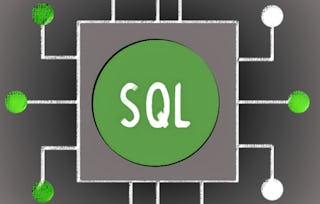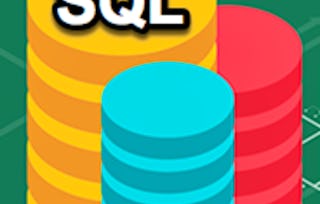This course will introduce students to the basics of the Structured Query Language (SQL) as well as basic database design for storing data as part of a multi-step data gathering, analysis, and processing effort. The course will use SQLite3 as its database. We will also build web crawlers and multi-step data gathering and visualization processes. We will use the D3.js library to do basic data visualization. This course will cover Chapters 14-15 of the book “Python for Everybody”. To succeed in this course, you should be familiar with the material covered in Chapters 1-13 of the textbook and the first three courses in this specialization. This course covers Python 3.

Using Databases with Python

Using Databases with Python
This course is part of Python for Everybody Specialization

Instructor: Charles Russell Severance
Access provided by University of Michigan
540,707 already enrolled
21,561 reviews
What you'll learn
Use the Create, Read, Update, and Delete operations to manage databases
Explain the basics of Object Oriented Python
Understand how data is stored across multiple tables in a database
Utilize the Google Maps API to visualize data
Skills you'll gain
Details to know

Add to your LinkedIn profile
5 assignments
See how employees at top companies are mastering in-demand skills

Build your subject-matter expertise
- Learn new concepts from industry experts
- Gain a foundational understanding of a subject or tool
- Develop job-relevant skills with hands-on projects
- Earn a shareable career certificate

There are 5 modules in this course
To start this class out we cover the basics of Object Oriented Python. We won't be writing our own objects, but since many of the things we use like BeautifulSoup, strings, dictionaries, database connections all use Object Oriented (OO) patterns we should at least understand some of its patterns and terminology.
What's included
12 videos4 readings2 assignments
We learn the four core CRUD operations (Create, Read, Update, and Delete) to manage data stored in a database.
What's included
6 videos1 assignment2 app items
In this section we learn about how data is stored across multiple tables in a database and how rows are linked (i.e., we establish relationships) in the database.
What's included
8 videos1 assignment1 app item
In this section we explore how to model situations like students enrolling in courses where each course has many students and each student is enrolled in many courses.
What's included
4 videos1 assignment1 app item
In this section, we put it all together, retrieve and process some data and then use the OpenStreetMaps API to visualize our data.
What's included
5 videos3 readings1 app item
Earn a career certificate
Add this credential to your LinkedIn profile, resume, or CV. Share it on social media and in your performance review.
Instructor

Offered by
Why people choose Coursera for their career

Felipe M.

Jennifer J.

Larry W.

Chaitanya A.
Learner reviews
- 5 stars
82.13%
- 4 stars
14.17%
- 3 stars
2.26%
- 2 stars
0.47%
- 1 star
0.95%
Showing 3 of 21561
Reviewed on Jul 5, 2018
Well taught course, with material made easy to understand and discussed in an engaging way. The assignments really help to solidify your understanding and are like puzzles that I enjoy working at.
Reviewed on Nov 21, 2017
the way this course is design is absolutely amiziong. just good amount of most important information is provided. task are not too complecated to finish (maybe coudl be little more dificult:) love it!
Reviewed on Jan 16, 2016
Excellent refresher for me; and a good basic level course for those new to programming and want to understand the basic concepts of writing code, connecting and parsing data in a much easier way.





